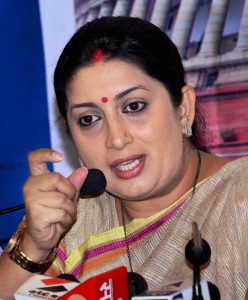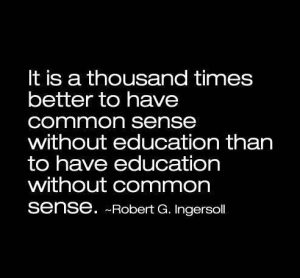
Too much of flak is thrown at Narendra Modi’s cabinet selection; especially his decision of giving Smriti Irani the charge of HRD Ministry is stormed out of proportion. Congress leader Ajay Maken has condemned the selection with a series of tweets questioning educational qualifications of Smriti Irani. ‘Wondering how someone who has been made in charge of HRD falls short of educational qualifications she is not even a graduate’ Ajay Maken tweeted. BJP Party loyalist Madhu Kishwar also twitted that HRD is a crucial ministry deserving heavy weight who can deal with Chief Ministers, Vice Chancellors, Researchers and Research Institutions and that she hopes that Smriti Irani’s selction will not saddle HRD ministry with lightweight who knows nothing about intellectual challenges facing education sector.
Jammu and Kashmir chief minister Omar Abdullah criticized Mr Maken’s comment saying “To say that someone needs to be educated to be HRD Min is like saying one needs to be a pilot for Civil Aviation or a miner for Coal Min (sic).”
The Ministry of Human Resource Development (MHRD) was established in 1985 dissolving the Ministry of Education. The MHRD has two departments: Department of School Education and Literacy, which oversees primary school education and literacy, and the Department of Higher Education, which oversees with secondary and post-secondary education. The Ministry’s function is to address the public and private education sector functioning by writing policies, programmes, schemes and legislation in coordination with other Ministries for the betterment of people’s education and literacy.
Some veterans in this trade believe that for running ministries such as HRD, Communications, Science and Technology, Finance it is essential for a minister to be formally studied these disciplines. On the other hand, if it is tourism ministry, child and women welfare, or the ministry of religious affairs, then educational qualifications should not matter much; the minister’s common sense should be sufficient.
Pakistan had a minister of railways who was a retired ISI [Inter-Services Intelligence] general who didn’t know a bit of knowledge or inclination about engines or coaches: it seems, the ones he ordered from China were too big to fit the Pakistani railway platforms so the platforms had to be widened all the way from Karachi to Peshawar, and by then, most of the railway engines turned out to be junk. In India we have witnessed Lalu Prasad who’s famous for his rustic sense and logic. He kept his kin out of Rail Bhavan when he got complaints about them. He had the wisdom to appoint Sudhir Kumar as Officer on Special Duty and back him up fully in reforming the Railways; Lalu Prasadfor change will be remembered for bringing life back to Indian railways.

Haven’t we seen assembly’s in the world with only graduates and post graduates who have given shattering performances? I am of the opinion that a formal qualification will carry weight if it is from a genuine institution; and if it genuinely attended by the degree holder. So we have to think of better criterion other than qualifications. Knowledge without an ability of execution is worthless. Emphasis should be on the actual competence of the person than the glitterati. When it comes to Ministers of this most diverse nation, a formal training in some disciplines is vital. Public at large is observing each action of the ministers and they would want to see a track record. Another point that begs a thought – Can a ministry be run like a corporate? Why not? It is like a new government taking over from the older government. The new government needs to realize realities, tackily all problems created by the older government, do a feasibility study, counter the deficits in budgets, complete the incomplete projects of previous government, put an end to the gaffes of the previous government, redesign the policies, redesign the mandates, redesign the strategies and reposition itself. In short, the government cannot be stuck in the past. And, for sure, Narendra Modi will act fast, make quick decisions, and implement effective policies.
A first time minister should be groomed; trained to read and digest policy matters, be given briefing on effectiveness, presentation and communication. Why can’t a good handbook of do’s and don’ts be prepared by veteran ministers in collaboration with expert academicians? A structural briefing is a must until the ministers are mastered and trained. So, let’s not condemn Smriti Irani’s qualifications, let’s give her some time, and let’s observe her style of decision making. Credentials are good but they don’t entitle you to success. Many successful people, business leaders are school dropouts – they possess the uncommon prerequisite and that is “common sense.”













































